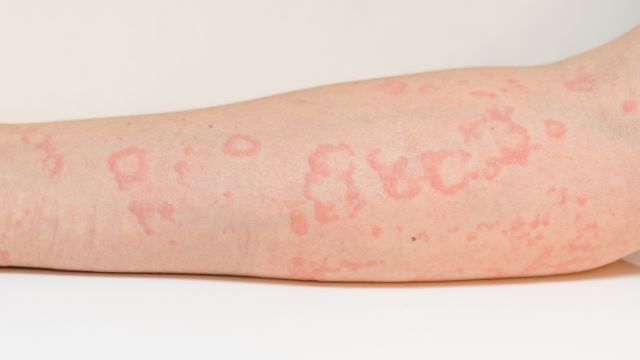Chronic spontaneous urticaria (CSU) is a condition where a person experiences persistent or recurring hives. Hives, or urticaria, are raised bumps or patches of swollen skin that itch. People with CSU may also experience angioedema, swelling that occurs in the deeper layers of the skin (opposed to hives, which appear on the surface of the skin).
The term chronic is used to describe conditions that last for a long time—in this case, six weeks or longer, with hives occurring on most days. Episodes do not have any consistent or identifiable trigger (which is the case with chronic inducible urticaria). In addition to the physical symptoms and discomfort, CSU frequently causes psychological and emotional distress.
What to discuss with your healthcare provider
Treatment for CSU is typically overseen by an allergist/immunologist or a dermatologist. The goals of treatment are to keep symptoms controlled and minimize the impact that the condition—and treating the condition—have on a person’s life. For many people, CSU is temporary, and will eventually resolve or improve.
Determining how CSU has impacted your life is one of the most important factors to consider when talking to your healthcare provider and making treatment decisions. Here are some questions to consider when determining what you need from treatment:
- How would you describe the severity of your CSU?
- How often do you experience physical discomfort or pain?
- How has CSU impacted your life? Has it affected work or school, relationships, what you do or want to do, or how you feel about yourself?
- Another way of phrasing the previous question: How would life be different if you didn’t have CSU?
- How often do you feel sad, frustrated, angry, or lonely? Have you noticed any changes in your moods that you think are caused by having CSU?
- Do you ever feel embarrassed because you have CSU? Do you ever avoid going out because of CSU?
- How many hours of sleep do you get on a typical night? Do you feel rested after sleep? Do you experience fatigue?
- How do you feel about your current treatment plan? Have you tried other types of treatment in the past? How did you feel about previous treatments?
- Are you concerned about the out-of-pocket costs of treating CSU?
- What is the most difficult aspect of living with CSU? This can be a symptom or a way that it impacts your life.
- How would you describe your health outside of having CSU? Are there aspects of your health that you would like to change, such as eating differently or exercising more?
It can help to write down a list of topics that you want to discuss at your appointment. It can also help to keep a journal.
Know your treatment options
Antihistamines are often the first medications used to treat CSU. Oral steroid medications may be used to relieve symptoms during a severe episode but cannot be used for long-term control.
People with severe and difficult-to-control CSU may be prescribed a biologic therapy—a drug that acts on the inflammatory pathways in the immune system. Additional medications that suppress or act on the immune system are also used in some cases.
It’s important to remember that there is no best treatment for CSU—only a treatment that is right for a particular person at a particular time. Your healthcare provider will be your best source of information.






